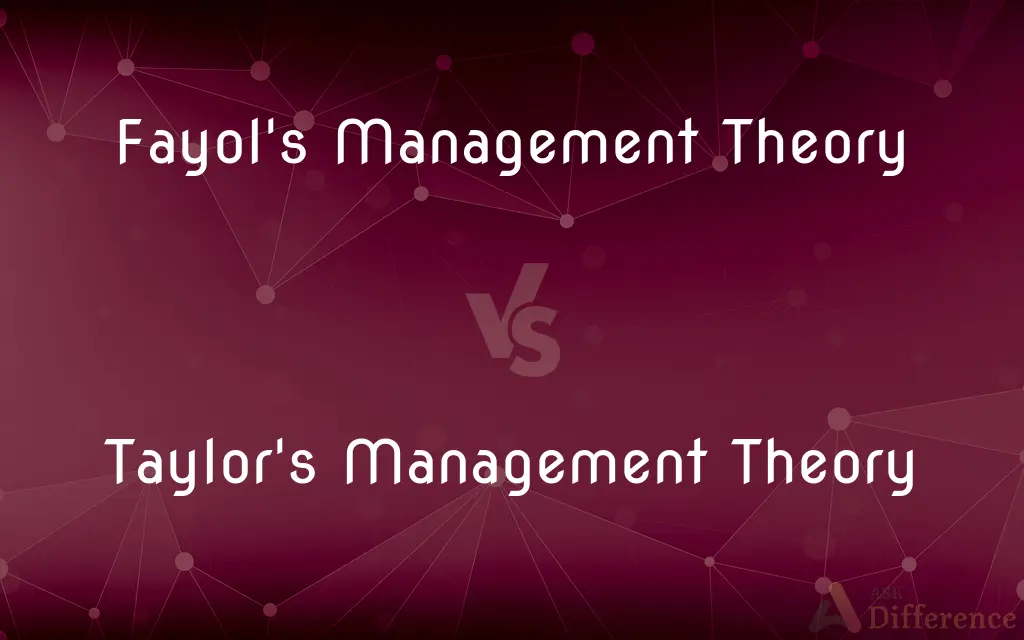Fayol's Management Theory vs. Taylor's Management Theory — What's the Difference?
Edited by Tayyaba Rehman — By Fiza Rafique — Published on December 9, 2023
Fayol's Management Theory focuses on administrative management principles and organizational structure. Taylor's Management Theory emphasizes scientific management and efficiency in task execution.

Difference Between Fayol's Management Theory and Taylor's Management Theory
Table of Contents
ADVERTISEMENT
Key Differences
Fayol's theory offers general principles for managing organizations, while Taylor's focuses on optimizing individual tasks and productivity.
Fayol emphasized organizational structure and management functions, whereas Taylor focused on scientific methods for task efficiency.
Fayol's approach is more holistic, considering the entire organization, while Taylor’s theory is more about operational efficiency at the task level.
Fayol provided a top-down management perspective, while Taylor concentrated on bottom-up approaches to improve labor productivity.
Fayol's theory influenced broader management practices, while Taylor's had a more direct impact on operational procedures and time management.
ADVERTISEMENT
Comparison Chart
Focus
Administrative management, organizational structure
Task efficiency, scientific management
Approach
General management principles
Specific techniques for productivity
Orientation
Holistic, organization-wide
Task-specific, operational
Perspective
Top-down
Bottom-up
Primary Contribution
Management functions, principles
Time and motion studies, efficiency
Emphasis
Administration, authority
Labor productivity, methods
Impact
Strategic management practices
Operational efficiency, workflows
Organizational View
Macro view of the organization
Micro view of individual tasks
Legacy
Foundation for administrative theory
Basis for modern operational management
Employee Focus
Managerial roles and functions
Worker efficiency and output
Compare with Definitions
Fayol's Management Theory
A holistic view of organizational management.
Adopting Fayol's Management Theory, the firm redefined its management processes.
Taylor's Management Theory
A theory focused on scientific management and task efficiency.
Taylor's Management Theory was applied to optimize their assembly line.
Fayol's Management Theory
A theory focusing on organizational structure and management functions.
Under Fayol's Management Theory, the company emphasized clear hierarchical structures.
Taylor's Management Theory
A perspective on maximizing task efficiency.
Using Taylor's Management Theory, the company streamlined its production.
Fayol's Management Theory
A theory outlining general management principles.
Fayol's Management Theory influenced their emphasis on unity of command.
Taylor's Management Theory
A bottom-up approach to operational management.
Taylor's Management Theory inspired the redesign of their manufacturing process.
Fayol's Management Theory
A framework for administrative management principles.
Fayol's Management Theory guided their approach to departmentalization.
Taylor's Management Theory
A framework for improving labor productivity.
Implementing Taylor's Management Theory, the factory saw increased output.
Fayol's Management Theory
A perspective on the roles and skills of managers.
Fayol's Management Theory shaped their managerial training programs.
Taylor's Management Theory
A method emphasizing time and motion studies.
Taylor's Management Theory guided their time study for workflow improvement.
Common Curiosities
How does Taylor's Management Theory improve efficiency?
Taylor's Management Theory uses scientific methods and time studies to optimize task efficiency.
What’s a key principle in Fayol's Management Theory?
One key principle is the unity of command, ensuring clear authority lines.
Can Taylor's Management Theory be applied organization-wide?
While it's task-oriented, its principles can influence broader operational efficiency.
Is time and motion study part of Taylor's Management Theory?
Yes, it’s a core aspect of improving efficiency in tasks.
How does Taylor's Management Theory view employees?
It sees them as parts of a system, focusing on maximizing their task productivity.
What is the main focus of Fayol's Management Theory?
Fayol's Management Theory focuses on organizational structure and administrative management principles.
Can Taylor's Management Theory influence wage systems?
Yes, it can guide performance-based pay systems for efficiency.
Can Fayol's Management Theory help in strategic planning?
Yes, its principles can guide overall organizational strategy and structure.
Does Fayol's Management Theory include scientific management?
No, it’s more concerned with administrative aspects than scientific task management.
Does Fayol's Management Theory address individual tasks?
No, it’s more about overall organizational structure and management functions.
Is worker satisfaction a focus in Taylor's Management Theory?
It’s not a primary focus, which is more on task efficiency and output.
How does Fayol's Management Theory view the role of managers?
It sees managers as key in organizing and controlling organizational activities.
Are Fayol's principles applicable across industries?
Yes, they are general enough to be applied across various industries and organizations.
Does Fayol's Management Theory have a top-down approach?
Yes, it views management from a top-down perspective.
What's the impact of Taylor's Management Theory on modern management?
It laid the foundation for operational management and efficiency practices.
Share Your Discovery

Previous Comparison
Channel Proteins vs. Carrier Proteins
Next Comparison
Regional Party vs. National PartyAuthor Spotlight
Written by
Fiza RafiqueFiza Rafique is a skilled content writer at AskDifference.com, where she meticulously refines and enhances written pieces. Drawing from her vast editorial expertise, Fiza ensures clarity, accuracy, and precision in every article. Passionate about language, she continually seeks to elevate the quality of content for readers worldwide.
Edited by
Tayyaba RehmanTayyaba Rehman is a distinguished writer, currently serving as a primary contributor to askdifference.com. As a researcher in semantics and etymology, Tayyaba's passion for the complexity of languages and their distinctions has found a perfect home on the platform. Tayyaba delves into the intricacies of language, distinguishing between commonly confused words and phrases, thereby providing clarity for readers worldwide.













































